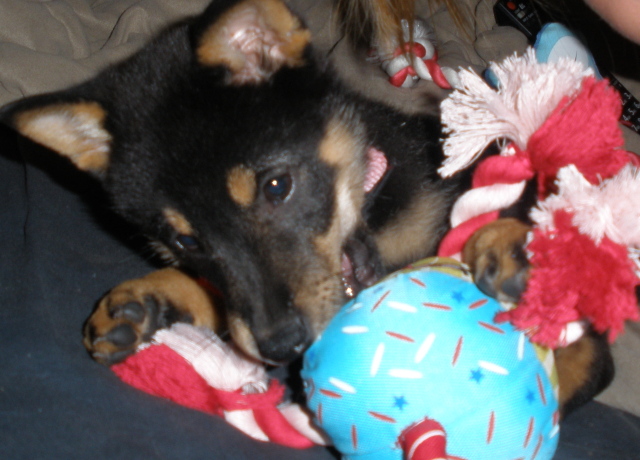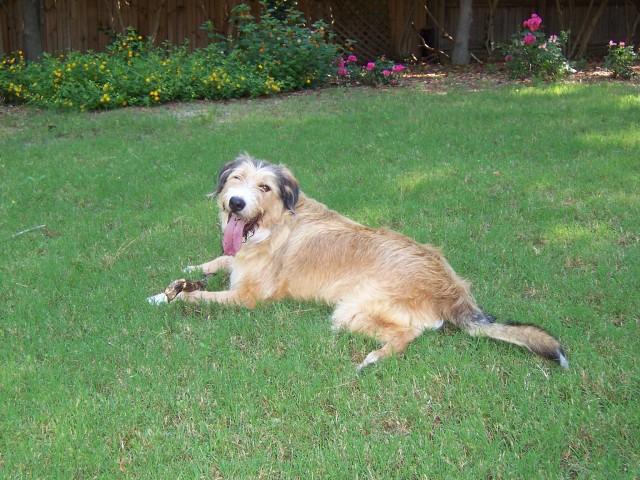QuestionHello-
About a month ago one of our 9-year old dogs died suddenly of cancer. He and our surviving dog, both mutts, were constant companions and grew up together. In the month since the death, our survivor, Arlie, has been quieter, almost sullen, not eating well (he used to eat all his food quickly and now he picks at it)and spends a lot of time alone in our bedroom. We're at wits' end and don't know how to please him. In our attempt to please him and to help ourselves through our grief, we began taking him on walks and rides at least daily and make huge efforts to include him in much of what we do, including just sitting in the living room each evening with us. He seems to have little interest in us except for rides and walks. Have we made too many changes? Should we not "bug" him to spend time with us or should we force the issue?
He is not aggressive at all although we believe he has some pitt bull in him. He has some problems with sudden noises. Separation anxiety has been a problem and we use low doses of acepromazine to help. Any suggestions you have would be welcomed. He's a sweetie and we just want him to spend time with us.
Thank you for any help you can give.
Susan
AnswerI'm sorry for your loss. I understand only too well how hard it is to lose a dog companion. Your remaining dog is most likely reacting especially hard to the loss of your other dog because he may have been bonded more heavily to the DOG than to you. This is not an uncommon occurrence and often people in multiple dog households don't recognize it. If the dog that died was the most outgoing and social toward you, then the remaining dog was most likely following him or her and more heavily bonded to him or her. His "little interest" in you may be lifelong, something you may not have especially noticed; if this is not the case, and if he has totally become emotionally distant from you, you need to bring this to the attention of ANOTHER VETERINARIAN, not the one who has prescribed acepromazine!! That drug is NOT a drug to be used on a daily basis; in fact, it's intended as a sedative RARELY, not continuously! There's evidence to suggest that the overuse of this drug causes BRAIN DAMAGE. You can read some facts about this drug here:
http://www.wedgewoodpharmacy.com/monographs/AcepromazineMaleate.asp
Find another veterinarian! There are other drugs available to treat separation anxiety, generalized anxiety and fear in dogs, one of them being Clomicalm, which will treat the dog's generalized anxiety in the situation he now finds himself. Meanwhile, you are doing all you can to attempt to provide companionship for this dog. Old dogs CAN learn NEW TRICKS, so beginning a regimen of positive reinforcement training (go to karen pryor's web site and/or read Patricia McConnell Ph.D.'s book on this topic) will help. It will open a new avenue of "communication" between you and your dog; it will facilitate the dog's cognitive abilities and hopefully help him to habituate to his new rank in your household; and it will definitely get, and keep, his attention. Continue interacting with him, taking him out and for rides, and close that bedroom door so he can't isolate himself. Don't overdo your attention or you may be inadvertently rewarding his negative behavior and thought processes. Once you've seen a new veterinarian, report back.

 My Shiba Inu
Question
Lola
I bought a registered Shiba Inu puppy fro
My Shiba Inu
Question
Lola
I bought a registered Shiba Inu puppy fro
 Nightmares?
Question
Beethoven
Hi Melissa, Ive had my very h
Nightmares?
Question
Beethoven
Hi Melissa, Ive had my very h
 anxious dog
Question
Louie
Hi, We adopted a 2 year old male A
anxious dog
Question
Louie
Hi, We adopted a 2 year old male A
 Agressive 1 yr old mini goldendoodle
Question
our millie
My husband and I got our min
Agressive 1 yr old mini goldendoodle
Question
our millie
My husband and I got our min
 Very Scared Dog
Question
Happy
My dog is 17 months old and is a mixed b
Very Scared Dog
Question
Happy
My dog is 17 months old and is a mixed b